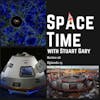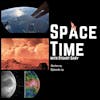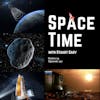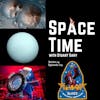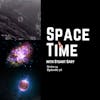63: An Earth-like atmosphere may not survive Proxima b's orbit

the world's premiere Astronomy and Space Science News Podcast
Stream episodes on demand from www.bitesz.com (mobile friendly)
* An Earth-like atmosphere may not survive Proxima b's orbit Proxima B -- the nearest known exoplanet to our solar system is probably a dead world despite being in the habitable zone of its host star Proxima Centauri. Any Earth-sized world would most likely be unable to hold onto an atmosphere -- leaving its surface exposed to harmful stellar radiation and reducing its potential for habitability.
*New clues in determining the size of a black hole Astronomers have discovered what could be an easy way to determine the size of a spiral galaxy’s supermassive black hole. They’ve found a direct relationship between the geometry of some types of spiral galaxies and the hidden supermassive black hole at their centres.
*Calm seas on Titan could mean smooth landing for future space probes Astronomers have determined that the lakes and season the Saturnian moon Titan have few waves higher than a centimetre. The findings mean the giant moon probably has little wind – the primary driving force for waves on the oceans of Earth.
*Huge storm on Neptune Astronomers have detected a massive storm as big as the Earth on the distant planet, Neptune. This massive 9000-kilometer wide storm system was found in Neptune’s equatorial region – a zone where no bright clouds have ever been seen before. *Skywatching on the road The neat little portable telescopes you can take with you when you’re traveling.
*The Science Report Loneliness and social isolation poses a greater public health hazard than obesity Man-made climate change to cause 60,000 deaths globally in the year 2030 People who survive a stroke without early complications have increased risk of death, another stroke or heart attack for at least 5 years, Two remarkably different animal communities around two relatively nearby hydrothermal deep-sea vents Humans can identify emotions in the voices of all air-breathing vertebrates.
Subscribe, rate and review SpaceTime at all good podcasting apps…including iTunes, audioBoom, Stitcher, Pocketcasts, Podbean, Radio Public, Tunein Radio, google play, etc.
Email: SpaceTime@bitesz.com
Join our mailing list at http://www.bitesz.com/join-our-mailing-list
If you're enjoying SpaceTime, please help out by sharing and telling your friends. The best recommendation I can get is one from you. Thank you...
#astronomy #space #science #technology #news #astrophysics #NASA
Learn more about your ad choices. Visit megaphone.fm/adchoices
Support this show http://supporter.acast.com/spacetime.
See acast.com/privacy for privacy and opt-out information.
The Astronomy, Space, Technology & Science News Podcast.
New to SpaceTime with Stuart Gary?
Here are some great episodes to start with.








































